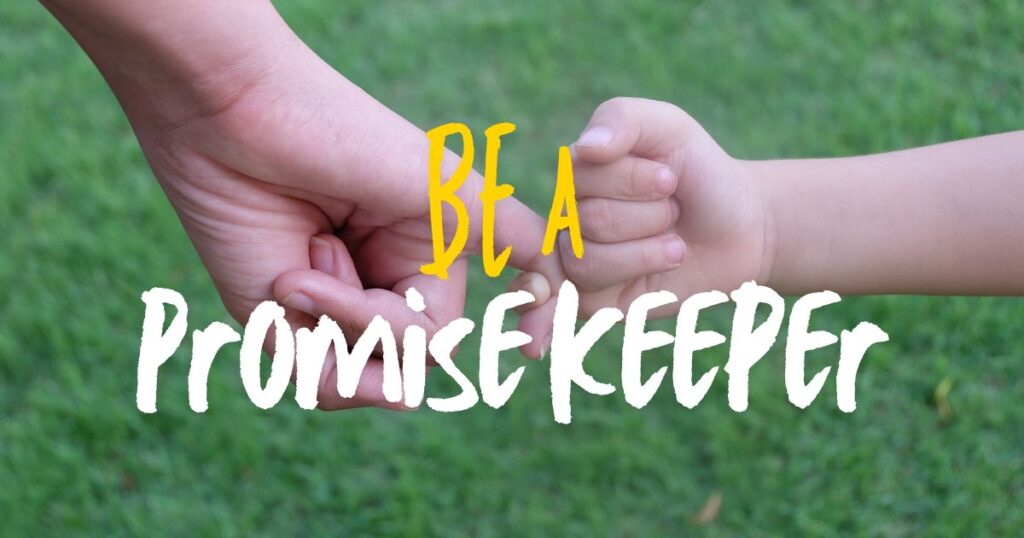We’ve all been there. You’ve had a long day at work, the traffic was a nightmare, and that promised trip to the park just isn’t going to happen. “Maybe tomorrow,” you say, trying to soften the blow. In that moment, it might feel like a minor setback, a small white lie to get through a stressful evening. But what we often fail to realize is that a broken promise, no matter how small or well-intentioned, can have a profound impact on a child’s world.
I have a son who has been hurt more than once by people who make promises but fail to follow through. He is especially sensitive when it comes from someone in a position of authority. I’ve had several conversations with him about times when his college golf coach said one thing or committed to something, only not to deliver later. The same has happened with bosses or others he has worked for — promises made, then broken. While this is something we all experience in life, for him it causes a significant loss of trust and credibility, and it deeply affects the relationship.
To an adult or a parent, a promise is a fluid thing, a commitment that can be adjusted or postponed due to circumstances beyond our control. But to a child, a promise is a contract, a fundamental part of their understanding of trust and reliability. When we don’t follow through, we aren’t just canceling an activity; we are unknowingly teaching them lessons about trust, security, and their own value. The look of disappointment on their face isn’t just about missing out on ice cream; it’s about a crack forming in the foundation of your relationship.
The consequences of breaking promises
Below, let’s talk about why these seemingly minor moments matter so much and what happens when we break a promise to our children. We’ll delve into the less obvious consequences, from the erosion of trust to a child’s developing sense of self-worth. It’s a crucial conversation for every parent because our words today are building the blueprint for our child’s future relationships. Consider these outcomes:
- Erosion of trust. When a promise is broken, a child learns their parent’s words aren’t reliable. This can create a foundation of distrust that may extend beyond just promises. For example, a child might start to question if a parent’s reassurances (“Don’t worry, you’ll be safe”) are true, leading to anxiety. This erosion of trust can damage the core of the parent-child relationship, making it harder for the child to confide in the parent during difficult times later in life.
- Feelings of unimportance. A broken promise can make a child feel that their desires and feelings don’t matter. They might think, “My parent would have kept the promise if I were more important to them.” This can lead to a damaged sense of self-worth. Over time, these feelings of being a low priority can contribute to low self-esteem and a belief that they aren’t deserving of a parent’s attention or care.
- Disappointment and hurt. Children often have vivid imaginations and build up a broken promise in their minds. For instance, a promised trip to the park isn’t just a trip; it’s a day of swinging, sliding, and playing with their parent. When that promise is broken, the disappointment is not just about the missed event but about the shattered fantasy. This can lead to visible sadness, anger, and feelings of betrayal, which can be difficult for a child to process.
- Insecurity. A child’s world is built on predictable routines and reliable caregivers. When a promise is broken, it can make their world feel unpredictable and unsafe. This uncertainty can create insecurity, where the child constantly worries about whether a parent will follow through on their word. This can manifest as anxiety, clinginess, or a fear of being let down again. A child may start to question other reliable aspects of their life if a core promise from a trusted adult is broken.
- Modeling of bad behavior. Children are keen observers and learn how to behave by watching their parents. If they see that it’s acceptable to break a promise, they may start to do the same with their friends, siblings, and even their parents. This can lead to a pattern of unreliability in their own relationships. They learn that a verbal commitment isn’t a firm one, which can be detrimental to their future social development.
- Disrespect. A parent’s authority and integrity are closely linked. When a promise is broken repeatedly, a child may lose respect for their parent. They may start to see the parent as someone who cannot be trusted to follow through on their word, which can lead to a general disregard for their rules and expectations. This can make discipline and guidance much more challenging. The child might think, “Why should I listen to you when you don’t keep your own word?”
- Difficulty with future communication. A broken promise can create a breakdown in communication. If a child learns not to trust what a parent says, they may stop listening altogether. For example, a parent who threatens a consequence they don’t follow through on will find that the child no longer takes their threats seriously. This can lead to a cycle of broken trust, where both parties become less invested in their verbal commitments, making future communication ineffective.
- Blaming themselves. Young children often lack the cognitive ability to understand complex adult reasons for a broken promise (e.g., a long meeting at work). Instead, they may internalize the failure, thinking, “My parent didn’t take me to the park because I was bad” or “I’m not worth the time.” This can be a significant blow to their developing self-esteem, leading to feelings of guilt, shame, and a negative self-image.
Teaching lessons of honesty and commitment
Recognizing the impact of a broken promise is the first, crucial step. It’s easy to get caught up in guilt or frustration, but dwelling on the mistake won’t heal the hurt. Instead, this is an opportunity to teach your child about accountability, repair, and the resilience of relationships. The good news is that while breaking a promise can be damaging, your response to it can actually reinforce positive values and strengthen your bond. It’s about shifting from the immediate sting of disappointment to a thoughtful, intentional path forward. By understanding how to address these moments effectively, we can transform a potential setback into a powerful lesson in honesty and commitment, ultimately showing our children that even when things go wrong, trust can be rebuilt and reinforced.
1. Acknowledge and apologize sincerely. The first and most crucial step is to acknowledge the broken promise and apologize. Don’t make excuses or try to justify your actions. Instead, state clearly, “I am so sorry I broke my promise to take you to the park today.” A sincere apology validates your child’s feelings of disappointment and shows them that you respect their feelings.
2. Explain the reason briefly and honestly. Children are capable of understanding simple explanations. After you apologize, offer a brief, honest reason for why the promise couldn’t be kept. For example, “A meeting at work ran very late, and I didn’t get home in time to take you.” Avoid complex details or blaming others. This helps your child understand that the broken promise wasn’t their fault and that it was due to a real, external reason.
3. Validate their feelings. Validate your child’s emotions by acknowledging their disappointment. You can say, “I know you were really looking forward to it, and I understand why you are so sad/angry.” This shows empathy and helps your child feel seen and heard. It also teaches them that it is okay to feel their emotions and express them.
4. Offer a concrete plan to make amends. Don’t just say, “We’ll do it another day.” Instead, make a concrete plan to reschedule. Say something like, “I broke my promise, and I want to fix it. We will go to the park on Saturday morning. Can we write it on the calendar right now?” This demonstrates that you are serious about keeping your word and are committed to making things right.
5. Discuss the importance of promises. After the initial moment of disappointment has passed, you can have a conversation about the importance of keeping your word. You can talk about how much it hurts when a promise is broken and how hard it is for you to break a promise to them. This models integrity and reinforces the value of promises in relationships. It’s a powerful way to turn a negative experience into a positive life lesson.
It’s a moment every parent dread: the look of disappointment on your child’s face after you’ve broken a promise. While it’s easy to feel like you’ve failed, this moment doesn’t define you as a parent. We all face unexpected challenges that make it impossible to keep our word, but your response is what truly matters. Instead of letting guilt take over, see this as a powerful opportunity to model accountability and integrity.
You have the chance to show your child that making a mistake isn’t the end of the world, it’s a chance to learn, apologize, and make things right. Your child’s trust isn’t built on a foundation of perfection, but on the certainty that you will always strive to be honest and responsible. By handling a broken promise with sincerity and empathy, you can turn a moment of disappointment into a deeper lesson about forgiveness, resilience, and the true meaning of a loving relationship.

